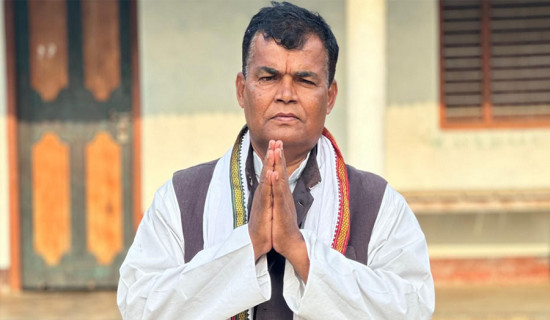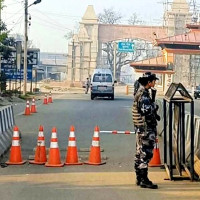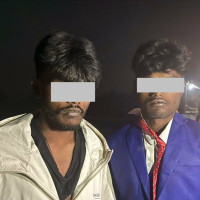- Wednesday, 4 March 2026
Ruminations Of A Senior Advocate
Madan Kumar Bhattarai
In our limited study of books in these fields, we are reminded of multiple volumes on many political thinkers, leaders and scholars. For example, an accomplished Australian scholar with multi-disciplinary backgrounds who spent 18 years as ambassador and was accredited to India twice with his second stint also looking after Nepal as Australia's first Ambassador after the two countries decided to formally establish diplomatic relations in 1960, wrote an impressive book on Pandit Jawaharlal Nehru.
Mainali who is now 77, has divided his quite impressive book dedicated to his late parents, Bishnu Kanta Mainali and Tanka Kumari Mainali, and with his portrait on the front cover and Mount Sagarmatha on the back side, into 58 highly readable chapters plus 32-page picture gallery. The author begins his preface with a rather philosophical bent of mind quoting from William Shakespeare's depiction of seven stages of lives of human beings in a poem attributed to one character of his famous play, "As You Like It".
As a diplomat, I am pleased to name another diplomat and Nepal's first Foreign Secretary, Narendra Mani Acharya Dixit, who wrote his maiden article in Nepali in the inaugural issue of Sharada, a literary magazine. Dixit got permission from Juddha Shumshere on the persuasion of another top diplomat Badakazi Marichi Man Singh Pradhan, with the same title, the world is a stage (Sansaar Naatyashaalaa Ho) causing ripples to the nascent editorial board.
The under-review book is an all-encompassing account, starting from the history of Mainalis and his own childhood time and family, educational days, that led him to have interface with different institutions, subjects and teachers of various backgrounds. The book also offers his cogent analysis of developments in Nepal, both positive and negative, including political evolution, his professional achievements and quite extensive visits to different parts of the world. Besides, it gives a bird's eye view of Nepali politics, including student politics and various facets of our political actors and almost all top lawyers he came across in his professional life.
There is no doubt that his interest in politics coupled with his roaring legal practice was instrumental in his cultivation of good working relations with many top political figures of different hues who were forced to seek his legal advice on various counts including litigations against the government. Mainali himself went behind the bars for his participation in anti-government agitations. Understandably, the eminent lawyer has dealt at length on some legal decisions including Supreme Court judgments that he prefers to dissent with.
In a nutshell, Bishwa Kanta Mainali seems to harbour a deep sense of frustration, both express and latent, on what he perceives serious failure on the part of our leadership to make real progress on socio-economic front. He accuses leadership of selling rosy but essentially fake dreams to the people made on this or that slogan in the name of changed polity or circumstance, causing agony of the common masses.
On the foreign policy front, the writer gives credit to King Mahendra for pursuance of an independent foreign policy. Lauding King Birendra's Peace Zone Proposal as an excellent step to make Nepal free from any possibility of being a place for power rivalry, and in tune with the aspirations of the country of Lord Buddha, he blames leaders and political parties for unilaterally sabotaging the fundamental proposition.
Despite so many plus points of the book, there are some glaring mistakes on factual account. For example, Mainali tends to give the impression that the much-talked about Nepal-India Treaty of Peace and Friendship of 1950 that he considers an obstacle to both Nepal's independence and progress, was thrust upon Nepal by Indian Prime Minister Nehru under compulsion when King Tribhuvan was in New Delhi under political asylum. In fact, the King's precipitate action that the author calls unnecessary and unfortunate, followed after more than three months of the signing of the treaty (page 29).
Likewise, it was Ishwari Lal Shrestha who was the head of the commerce faculty at Trichandra College and later Secretary of the government including Education Ministry, and not Surya Lal Shrestha (page 155). Similarly, talking of three top private libraries including those of Kaisher Shumshere and DrDilli Raman Regmi, he has erroneously named Heramba Raj Gurujyu as the library later sold to the government and now in a very bad shape, was Hem Library belonging to his younger brother and Nayab Bada Gurujyu Hem Raj Pandey (page 213). In addition, Professor Leela Nateshwar Sharma Baral, more popular as Dr Ishwar Baral in the literary world, was a PhD in history and not Nepali literature (page 238).
The book is a very interesting saga of the life, notions and perceptions of a fully accomplished senior advocate. Some minor gaffes are bound to be there when attempting such a comprehensive exercise. They don't really count. In fact, the book is an eloquent exposition of the man that we have known for long as not only most friendly and social with no generation gap but also very cooperative. I congratulate Mainali and his best half Professor Dr. Savitri Mainali on such a successful venture and look forward to reading the second volume of the autobiography dealing with the multi-dimensional life of a seasoned and dedicated intellectual.
(Dr. Bhattarai is a former Foreign Secretary and ambassador. kutniti@gmail.com)

















